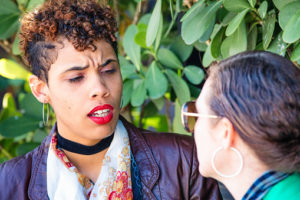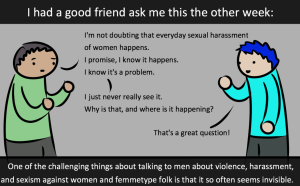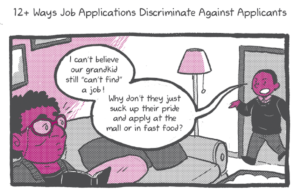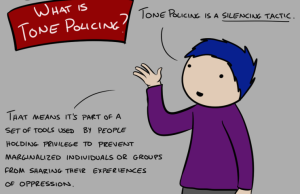When I was eleven, my family and I went shopping for my mom’s birthday present, and my dad suggested a leather belt. Even at that age, I had a strong conviction that killing animals for clothing was wrong. I didn’t want to pitch in for it.
After I expressed that, my dad gave me a talk about how you can’t impose your values on others. He said I was being intolerant for wanting everyone to dress like me. So, I gave in.
Looking back, I wasn’t the one being imposing. He was the one telling me how to spend my allowance money.
If I could talk to my eleven-year-old self now, I’d tell her to be firm and refuse to compromise her morals. I’d tell her that her sense of justice was a strength, not a weakness.
But repeated experiences like that have stayed with me. Over the years, I’ve learned to stay silent when I perceive that something’s wrong, so that others don’t feel judged. I’ve learned to desensitize myself to actions that upset me so no one can read the disapproval on my face.
In the process, I’ve learned to suppress who I am.
I’ve also learned there are ways of objecting to others’ choices that really are imposing. I’ve learned the difference between imposing my beliefs on others and refusing to let them impose theirs on me.
I’ve learned that no matter how problematic someone’s actions are, pointing out these problems isn’t always productive. I’ve learned to choose my battles.
But now, as a writer who covers social justice issues, I still struggle – as many activists do – to maintain relationships with those who don’t support my activism.
While tuning out my family has gotten easier, the issue still comes up with my partner. We’ve had multiple arguments after I’ve called out microaggressions he’s committed, he’s disagreed that they were a problem, and we’ve both felt silenced.
I’ve had to take a hard look at myself and understand that even though I should never have to suppress my opinions, I don’t want to express them in a way that makes people avoid even asking questions because they fear I’ll think less of them for using the wrong terminology or overlooking an issue.
But it’s also starting to occur to me that just because certain people take issue with my behavior, that doesn’t mean I have to change it, as long as I’m respecting their boundaries. And I don’t have to judge myself based on anyone else’s morals, just as they don’t have to judge themselves based on mine.
Here are a few ways I’m learning to practice self-care when my loved ones object to my activism.
1. Filter Feedback Based on Your Own Values
Occasionally, people will criticize me for two opposite reasons.
One thinks I’m too detail-oriented, another thinks I’m too focused on the big picture. One thinks I’m too vigilant about political correctness, another thinks I’ve neglected it.
These situations always serve as reminders that it’s impossible to take everyone’s feedback. You have to decide whose is valuable.
How do you decide that? By knowing what your goals are. One of my goals, for example, is to challenge the ways I’ve internalized white supremacy. So, somebody who criticizes me for using racist language is somebody I’m going to listen to.
Somebody who criticizes me because I got offended by a racist joke and supposedly need to relax and have a sense of humor is going to be filtered out.
In the first example, the person who criticizes the language I use helps me become who I want to be. The latter example makes me less like that person.
An easy way for me to figure that out was to ask myself who in my life I most admire. The answer was that I admire those who are constantly thinking about how they can be better allies to marginalized groups and challenging others to be better allies themselves.
Ignoring others’ feedback doesn’t mean you’re bad at taking criticism. It just means you’re selective about which criticism to take. You can simultaneously acknowledge your weaknesses and believe that certain “weaknesses” others perceive are actually strengths.
Develop the self-awareness to know the difference, and then trust that you have it.
2. Understand Where Your Own and Others’ Boundaries Are
Everything I just said also applies to people who espouse viewpoints unlike my own. Everyone has the right to decide what their goals are and filter feedback accordingly.
That means that while I can clearly and confidently state my opinion on someone else’s actions, it’s then up to them to react however they choose. I can’t try to push them to agree with me.
I, and I’d venture to say many activists, have struggled to know when exactly to quit. The line between educating somebody and forcing an opinion down their throat is hard to discern.
Despite what some may tell us, this isn’t because we’re intolerant or elitist. It’s because we feel a sense of responsibility to make the world a better place, and it can be heartbreaking to feel like we’re failing in that effort.
Generally, I’ve found it’s time to quit once I’ve given someone the opportunity to rethink their beliefs. I usually know after the first try whether they’re open to that. If they’re not, any additional attempt to persuade them can come off as imposing.
And rather than thinking less of them as people, I try to assume they want to be supportive allies but just haven’t had the opportunity to learn how. I remind myself that I, too, haven’t always been aware of why certain actions are problematic.
Recently, for example, an acquaintance used the word “pussy” to describe a cocktail. When I asked why, he said it was because it was weak.
“Why would pussy mean ‘weak’ when a pussy can pop out a baby?” I asked. He just shrugged and changed the subject. He didn’t care to learn about how language perpetuates misogyny.
The next time he used “pussy” in a similar manner, I didn’t interrupt him. The desire to call it out came from a good place, but I felt it’d be better directed elsewhere.
It also would’ve been acceptable to limit my time with him, to repeat that it bothered me, or to do anything that didn’t involve insulting him as a person or trying to coerce him into speaking differently.
On the flip side, one time in college, I made an observation about how people shower their pets with affection yet eat other animals. My friend’s boyfriend responded, “I’m not going to become a vegetarian, so just drop it.”
While he was right that telling him what not to eat would violate his boundaries, telling me what not to say violated mine. I was well within my right to make that observation.
While there is such a thing as expressing oneself in an adversarial way, accusations of being adversarial or aggressive are often just tone policing, especially when directed toward women or people of color.
So, yes, we should call out others’ actions in a way that acknowledges their autonomy. But we shouldn’t let anyone undermine our own.
3. Remember You Don’t Have to Justify Who You Do or Don’t Spend Your Time With
I’ve heard many people express the belief that there are certain things that are totally okay to judge someone on – like, say, if they’ve physically hurt someone – but if you judge them on less serious moral transgressions, you’re being too extreme or “living in a bubble.”
I’ve been told it’s okay to break up with someone because they’ve cheated, but too nitpicky to break up with someone because they’re not a feminist. That if you avoid befriending people who outright oppose LGBTQIA+ people’s existence, that’s totally reasonable, but if they make jokes at their expense, that’s not reason enough.
I disagree. I say, stay with who you want to stay with. Break up with who you want to break up with. Be friends with who you want to be friends with. We all need to define, for ourselves, which standards are reasonable and which are extreme.
You don’t need a reason for including or excluding someone from your life. It’s a personal choice.
Sometimes, cutting out those who don’t support your activism really is the best option. Otherwise, both people end up feeling shortchanged because they’re not helping each other become the people they want to become. How can they when they oppose each other’s values?
Since it can be so difficult to be an activist in a world that doesn’t always support activism, it’s important to surround yourself with supportive people and limit your interactions with those who make you feel like you have to change.
***
After years of being told that my strong moral compass made me snobby, judgmental, or pretentious, I’m finally starting to view it as a beautiful gift.
I have a drive to help others beyond myself or my own community. I hurt when others hurt. I’m glad I can experience the world in such a rich way. I’m glad I’m using my work to express that experience.
And I’ll never dim that light in anyone else.
I’ll never call somebody too sensitive for caring about all lives, human or non-human. I’ll never call someone adversarial for correcting harmful language. I will never judge someone for who they spend their time with.
And if I’m ever in a position of authority over children, I will never encourage them to do anything that goes against their morals.
[do_widget id=’text-101′]
Suzannah Weiss is a Contributing Writer for Everyday Feminism. She is a New York-based writer whose work has appeared in The Washington Post, Salon, Seventeen, BuzzFeed, The Huffington Post, Bustle, and more. She holds degrees in Gender and Sexuality Studies, Modern Culture and Media, and Cognitive Neuroscience from Brown University. You can follow her on Twitter @suzannahweiss. Read her articles here.
Search our 3000+ articles!
Read our articles about:
Our online racial justice training
Used by hundreds of universities, non-profits, and businesses.
Click to learn more





















